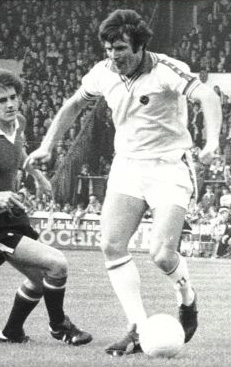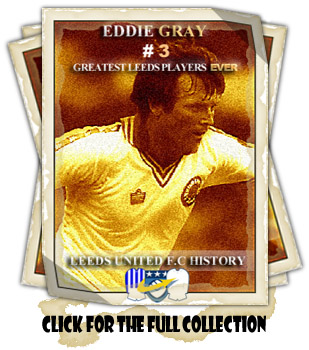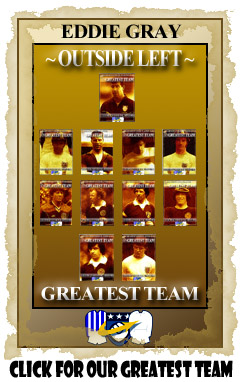

Gray: Edwin (Eddie)
1965-1984
(Player Details)
Outside Left/Left Back
Born Holyrood, Glasgow: 17-01-1948
Debut v Sheffield Wednesday (h): 01-01-1966
5’11” 12st 7lb (1979)
#3 in 100 Greatest LUFC Players Ever

Outside Left in Greatest LUFC Team

Gray was a cultured winger who was an integral member of the legendary Leeds United
football team of the 1960s and 1970s, later twice becoming the club's manager. Eddie Gray
was without doubt the most gifted player ever to play for Leeds United, he was better than
George Best but did not get the same recognition because he played for Leeds. Gray was a
schoolboy international for Scotland, and signed professional forms for Leeds at the age
of sixteen in January 1965. When Eddie first came to Leeds he played in a practice match
against the first team, after the game Jack Charlton told Don Revie that Leeds had better
sign him as he did not want to have to play against him twice a season. He made his first
team debut on New Year's Day 1966, fewer than three weeks before his eighteenth birthday,
and went on to play for the club for almost twenty years. A winger in the classic mould,
Gray was feted in world football for his ability to beat opposing full backs for pace and
thought. As the Leeds team grew in stature and experience through the 1960s, Gray became a
vital component of the team. In 1968 he was in the Leeds team which won the League Cup and
the Fairs Cup and then the League championship a year later. It was in 1970 that he made
his most famous appearance in a Leeds shirt. The team was chasing a unique "treble" of
League championship, FA Cup and European Cup with Gray in sparkling form. Days before he
had already scored what many Leeds fans call the greatest goal ever by a Leeds player, a
solo run past at least six Burnley players in the space of twenty yards using his shoulder
drops to throw the opposition off balance then rolling the ball back, leaving the defenders
on the floor totally perplexed before cool as you like passing the ball into the net. In
the same game he had previously lobbed the keeper from thirty-five yards to score a goal
requiring many skills and a "jewel" in its own right. When his day came at Wembley for the
FA Cup final against Chelsea, Gray's immediate opponent was David Webb, an artisan defender
who he tortured for the ninety minutes and extra-time period. Webb was constantly left in
undignified positions in his wake as Gray ghosted past him. It was an exhibition that
earned him the "Man of the Match" trophy. Despite lop-sided possession the game still ended
in a 2-2 draw and a replay was required. Gray had taken the corner which had allowed Jack
Charlton to open the scoring and he had also rattled the crossbar with a right-foot shot.
In the replay, Chelsea changed tactics and put the more uncompromising Ron Harris to take
care of the threat posed by Gray and as a result, his danger was snuffed out through a
series of deliberate fouls which went largely unpunished. Chelsea won 2-1 and, as luck
would have it, it was the tormented Webb who headed the winner. Leeds lost the League
championship race to Everton and the European Cup Semi-Final to Celtic, and finished with
nothing to show for their season long endeavours, which had promised so much. Gray's
battles with injury then started, and he missed more than half of the 1971 season, during
which Leeds again snatched League championship defeat from the jaws of victory but won the
Fairs Cup again. He was in the team which won the FA Cup against Arsenal in 1972 and duly
lost it a year later to Sunderland, but missed out on a title medal when Leeds finally won
the League again in 1974 thanks to more injury woes. From 1970 to 1975, when his skills
should have been at their zenith and when he should have had the footballing world at his
feet, he made just eighty-two League appearances. Written off by some but encouraged by
Jimmy Armfield, he fought his way back to full health and during his rehabilitation coached
the juniors and forced his way back to first team recognition and played in the team which
reached the European Cup final in Paris in 1975 but lost, controversially, to Bayern Munich.
Also in the team was his younger brother Frank, who had likewise come through the ranks at
Elland Road. This was the swansong of the great Don Revie team, Revie himself had left a
year earlier to take over as England manager, and Gray's team-mates started to leave the
club. By the end of the 1970s, Gray was the only player from any part of the Revie era
still at the club, although Peter Lorimer would later make a comeback. Now converted to
left back, taking over from his brother, who had been transferred to Nottingham Forest,
Gray prolonged his career and was in the side which was relegated under former team-mate
Allan Clarke in 1982. Gray then took over as manager for two seasons, while still playing,
but finally left the club after being unable to regain promotion from the Second Division.
His association with Leeds was severed in 1985 after twenty years, five hundred and
sixty-one games and sixty-eight goals. He managed Whitby Town, Rochdale and Hull City
before returning to Leeds as a coach in the summer of 1995. Eddie returned to Elland Road
to help with the development of the youngsters, under Howard Wilkinson and in his first
full season saw the youth team lift the FA Youth Cup in 1996, as he worked alongside Paul
Hart. Then after the departure of Dave Williams to Manchester United in 1997, he became
reserve team coach, guiding the second string to the Pontins Premier Division title in his
first season in charge. His work with the youth set-up nurtured a terrific generation of
Leeds players such as Harry Kewell, Ian Harte, Alan Smith and Jonathan Woodgate, who all
went on to become first team regulars. He was an immediate choice to support David O'Leary
as his No.2 when the Irishman became Leeds boss in October 1998. Unfortunately O'Leary
decided to bring Brian Kidd in.This was clearly the point when Leeds United troubles all
began. Leeds United football got gradually worse, Leds were losing games they should have
drawn and drawing games they should have won. This meant that Leeds did not qualify for
the Champions League and all the financial problems became an issue. Both he and Brian
Kidd fell to a cost cutting exercise. When Peter Reid left Leeds in 2004, Gray was charged
with the task of trying to preserve their FA Premier League status, something which under
immense pressure, he could not do. Amidst all the notorious pontificating from ambitious,
headstrong board members, a self-obsessed chairman and fly-by-night managers, it was left
to a genuine Leeds man to try to stop the club from going to the wall. Gray parted company
once again with the club after relegation. Gray's unfortunate injury record meant that his
Scotland career was short and infrequent. He won just twelve caps and missed the 1974 World
Cup through injury. He made his International debut at Wembley on 10th May 1969 as England
triumphed 4-1 and just a week later he scored his first International goal, a trademark
wonder effort to open the scoring in the fifteenth minute, as Scotland hammered Cyprus 8-0
at Hampden Park. He also played in the World Cup Qualifiers in a defeats by West Germany
2-3 in Hamburg on 22nd October 1969 and 0-2 in Vienna by Austria on 5th November 1969. It
was not until 15th May 1971 that he got his next game in a 0-0 draw with Wales in Cardiff
but quickly picked up another three days later in a 0-1 defeat to Northern Ireland at
Hampden Park. He was on the winning side as Scotland beat Belgium 1-0 at Pittodrie on 10th
November 1971 but was then in a 1-2 defeat by Holland in Amsterdam on 1st December 1971.
After an extensive absence he was restored to the team on 6th May 1976 as Scotland hit
winning form in a 3-1 victory over Wales at Hampden Park, in which he got his second
international goal, as he netted the third Scottish goal in the sixty-ninth minute. Nine
days later he was part of the Tartan Army that beat England 2-1 at Hampden Park. His final
two appearances were at Hampden Park in winning Scottish teams, on 8th September 1976 as
Finland were beaten 6-0, with Gray scoring his final goal, when he scored Scotland's fifth
in the sixty-eighth minute, and on 17th November 1976 as Wales succumbed 1-0. He also
gained two Under-twenty-three caps. His first, when he scored twice in a 6-0 win over
Wales at Wrexham on 30th November 1966 and the second in a 3-1 win over England at Newcastle
on 1st March 1967. He was never booked in the whole of his career. Brother of Frank Gray,
uncle of Andy Gray. His sons Stuart, of Celtic and Reading and Nick, who was on Leeds
United’s books, both played professionally.